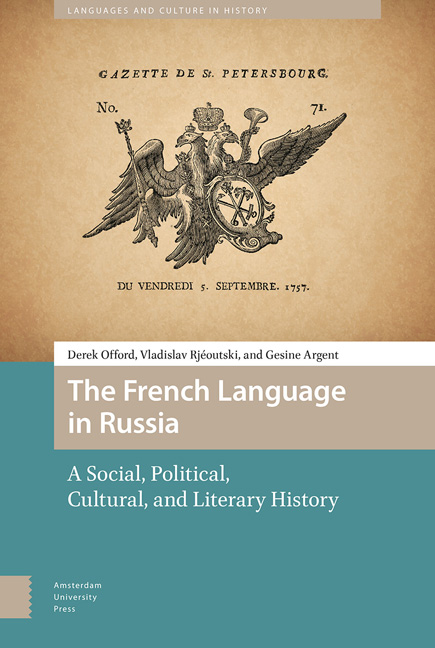Book contents
- Frontmatter
- Contents
- List of illustrations
- Preface
- Acknowledgements
- Presentation of Dates, Transliteration, and other Editorial Practices
- The Romanovs
- Introduction
- Chapter 1 The historical contexts of Russian francophonie
- Chapter 2 Teaching and learning French
- Chapter 3 French at court
- Chapter 4 French in high society
- Chapter 5 French in diplomacy and other official domains
- Chapter 6 Writing French
- Chapter 7 French for cultural propaganda and political polemics
- Chapter 8 Language attitudes
- Chapter 9 Perceptions of bilingualism in the classical Russian novel
- Conclusion The functions of French in imperial Russia
- Bibliography
- Index
- Languages and Culture in History
Chapter 5 - French in diplomacy and other official domains
Published online by Cambridge University Press: 16 February 2021
- Frontmatter
- Contents
- List of illustrations
- Preface
- Acknowledgements
- Presentation of Dates, Transliteration, and other Editorial Practices
- The Romanovs
- Introduction
- Chapter 1 The historical contexts of Russian francophonie
- Chapter 2 Teaching and learning French
- Chapter 3 French at court
- Chapter 4 French in high society
- Chapter 5 French in diplomacy and other official domains
- Chapter 6 Writing French
- Chapter 7 French for cultural propaganda and political polemics
- Chapter 8 Language attitudes
- Chapter 9 Perceptions of bilingualism in the classical Russian novel
- Conclusion The functions of French in imperial Russia
- Bibliography
- Index
- Languages and Culture in History
Summary
In the two preceding chapters, we have examined the use of French at the Russian court and in Russian high society, the principal domains in which francophonie served as a marker of social prestige and an expression of an outward-looking, pan-European identity. However, that same aristocracy which emulated the habits of the court, frequented the social venues we have identified, and circulated among European peers also occupied most of the high offices in the civilian administration of the Russian Empire and the high ranks in its armed forces. Nor was the boundary between the social life of the aristocracy and its life in imperial service rigid. Members of the same charmed circle met in different settings, social and professional, and they corresponded in different capacities, as both friends and colleagues. It was only to be expected, therefore, that they should to some extent function bilingually in the official or military realm as well as in the social realm – or rather, that male members of the elite should function in this way, for women, whose conspicuous introduction into the social sphere can be associated with the rise of francophonie in Russia, were entirely absent from the professional sphere. We therefore aim in this chapter to form an impression of the extent to which French was part of Russia's official life, as well as its social life, to discern the limits of its penetration in the official sphere, and to sense the pace of its progress there.
We shall go about this task mainly by studying language practice in the field of diplomacy, using a small part of the enormous extant archival holdings of documents that relate to the conduct of Russian foreign affairs. By focusing on this field, through which Russia's formal relations with the European world expanded and developed and were maintained in the eighteenth and nineteenth centuries, we thus complement our investigation of the role of foreign languages in the Europeanization of the Russian elite in the social and cultural spheres. After some introductory remarks on the ascendancy of French as Europe's principal diplomatic language in the late seventeenth and early eighteenth centuries, we consider foreign-language use in Russia before the age of Peter the Great and the development of language instruction, during Peter's reign, for men serving in offices dealing with foreign affairs.
- Type
- Chapter
- Information
- The French Language in RussiaA Social, Political, Cultural, and Literary History, pp. 263 - 326Publisher: Amsterdam University PressPrint publication year: 2018



